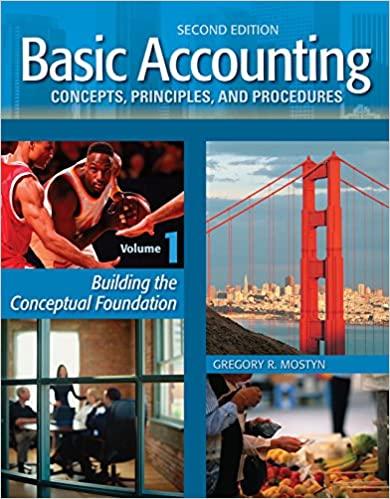Answered step by step
Verified Expert Solution
Question
1 Approved Answer
After having taken an MBA a friend of yours is planning to open a cafeteria in a well-known Pyrenees ski resort. In order to prepare
After having taken an MBA a friend of yours is planning to open a cafeteria in a well-known Pyrenees ski resort. In order to prepare the forecasted financial expenses for a potential investor he has asked you some help in order to double check the financial statements of the business.
The cafeteria would only be opened for 6 months (180 days), starting the 1st of November and until the 30th of April, so you must consider all the financial statements on a semester basis.
Expected sales in average:
- Breakfasts served: 25 breakfast per day at an average price of 10 each
- Lunch: 50 breakfast per day at an average price of 20 each
- Coffee: 3.000 cups per month at 2 each
- Sandwiches: estimated 1.000 per month at an average price of 4
- Soups: estimated 375 per month at an average price of 6
During the season, the cafeteria will host 2 private events for special guests of the resort:
New Years dinner party consisting in 100 menus at 100 (includes dinner and open bar), with an expected margin of 40%, which will be collected 30 days after its celebration (30th January).
Easters special lunch consisting in 100 menus at 50, with an expected margin of 30%, which will be collected 30 days after its celebration (end May)
Additionally, there will be extra revenues by selling souvenirs as postcards and fridge magnets. The forecast is to sell an equivalent of the 10% of the total revenues (excluding the private events). The cost of the souvenirs is barely the 10% of its price with collecting & payment conditions being the same as the rest of the cafeteria products.
The direct cost of the ingredients of every meal or food/beverage served is as following (over price):
- Breakfast: 30%
- Lunch: 35%
- Coffee: 20%
- Sandwiches: 50%
- Soup: 25%
The costs related to the goods sold (food, beverages, special events, souvenirs) will pe paid in average 30 days after its consumption.
You expect to have a stable headcount of the following positions:
- Waiters: 3 persons, with a gross salary of 1.000 per month (only during the 6 months season) plus a 30% of Social Security taxes.
- Cooker: 2 persons, with a gross salary of 2.000 per month (only during the 6 months season) plus a 30% of Social Security taxes
- Business manager with a gross salary of 5.000 per month (which applies for all year) plus a 30% of Social Security taxes
Salaries will be paid at the end of the month while SS taxes at the end of every calendar quarter.
Consumption of water, power and heat are expected to amount 3.000 per month. Since the payments is usually in 60 days, at the end of the season 1/3 of the utilities will remain unpaid.
As part of the agreement with the ski resort, cafeteria will have to liquidate and pay a royalty of an equivalent of the 10% of the total semester revenues (to be paid the month after the season ends).
Additionally, it has been calculated that other general expenses, as alarms, cleaning, kitchen tools, etc. will amount a 3% of the revenues, all of them paid within the season period.
The cafeteria will have to invest 60,000 in order to purchase some necessary assets for the operation, as chairs, tables, shelves, a fridge, an oven and cutlery. All those elements will be sold after the season at a 50% of its price value. All of them are expected to be paid during the first 3 months, while the collection of the end-season sale will be expected 60 days after the closing.
With the purpose to face the initial investment payment for the assets acquired, contemplate to get a bank loan with a 6 months maturity, repaid (principal plus interests) on the 30th April with a 6% annual compound interest rate.
Consider that 50% of the total revenues (including souvenirs and special events) are paid with credit card which results in a 1,5% financial cost for the cafeteria. The rest is being paid upfront.
Estimated tax provision is 25%, to be paid 60 days after the closing balance of the season.
The Balance sheet at the beginning of the period (1st November) only contained 10.000 of Cash and 10.000 of Capital stock.
1. Please elaborate the 2021-22 semester (Nov-April) Income statement and Cash-Flow Statement, showing in this case the 3 standard categories (Operational, Investing, Financial). Also complete the 31st April 2022 Balance Sheet and identify in it the differences between the Net Income and the Free Cash-Flow of the period. Comment all the results shown. (85 points: 25pts IS, 25pts CF, 25pts BS and 10pts for explaining and showing the differences).
2. If you were a potential investor what aspects would, you consider according the financial information seen above. Does the fact of being a seasonal business would affect your decision on investing or not? If the forecast was contemplating, 12 months rather than 6 would the financials change? Explain (15 points)





Step by Step Solution
There are 3 Steps involved in it
Step: 1

Get Instant Access to Expert-Tailored Solutions
See step-by-step solutions with expert insights and AI powered tools for academic success
Step: 2

Step: 3

Ace Your Homework with AI
Get the answers you need in no time with our AI-driven, step-by-step assistance
Get Started


